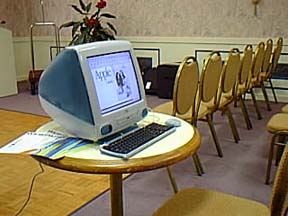Apple Computer company released for sale their new iMac today and you didn’t buy one and don’t intend to buy one in the future, so what does it mean to you? There are few new products that come along that actually have any impact on the marketplace, or on the technology of which they are apart. It remains to be seen if the iMac will produce the expected tidal wave.

But, even if the product is a complete flop, its existence changes the way things will be perceived. Engineers and scientist develop concepts and many of these are developed into new things, but all of them have the effect of advancing knowledge and capability. We all have been part of a conversation that deals with the rapid acceleration of technological advancement and these always seem to end with “where is this going to end?” Though a perfectly legitimate question, the answer is painfully obvious, “more and more.”
After the second world war we experience a period where money seemed to loose its value as “inflation” turned an eight cent soft drink into one we pay $1.00 or more for today. Science and technology is experiencing a similar fate with progress leading to additional progress and never do we see things slip backward.
The iMac will spawn a series of additional innovation in the computer industry as other manufacturers also focus on the “appliance”. No longer will people tell you they are too old to get involved in them computer things, those same people shuffle their walkers up to the microwave and punch their remote control buttons on their television and VCRs. It may be “12:00” but those appliances are working all around them and it seems that the computer is about to do just the same.
Apple missed the mark in the US by have their top line computer hit the market at $300 over the magic $1,000 level, but other companies will find ways to get products out that will be closer and though Apple still corners the market on ease of use, the others, with Windows will plug away at making a more usable information appliance.
Because the Macintosh is so much more usable and productive its owners produce most of the content on the Internet, and account for up to 60 % of all Internet users while they only compose 12% of all people owning computers. It was this realisation that prompted the development of Windows 3.1, then Windows 95 and now Windows 98. Each of these systems were intended to produce simple straight-forward utilisation of the computer and the increased productivity associated with that ease of use. The funky little iMac with its one click and the user is online, pushes the barrier further ahead as the user concentrates on the content rather then being required to have skill and ability to achieve connectivity.
We have all noticed that children are better at using computers then adults. The reason for this is that kids do not need to unlearn ways of doing things they just figure out what makes this or that tick and off they go, unencumbered by the confusion of dealing with a keyboard and trying to figure out what “enter” means. When we talk about computer use we often hear people say “I don’t know anything about them” and the facts of life are they shouldn’t have to know anything about them. The protected knowledge that comes from tricky old computer technology should never have occurred in the first place. None of us need to know about fuel injection and catalytic converters in order to drive a car nor should we spend a moment’s time trying to figure out how to do a “config” file. Plug it in turn it on and “do”.